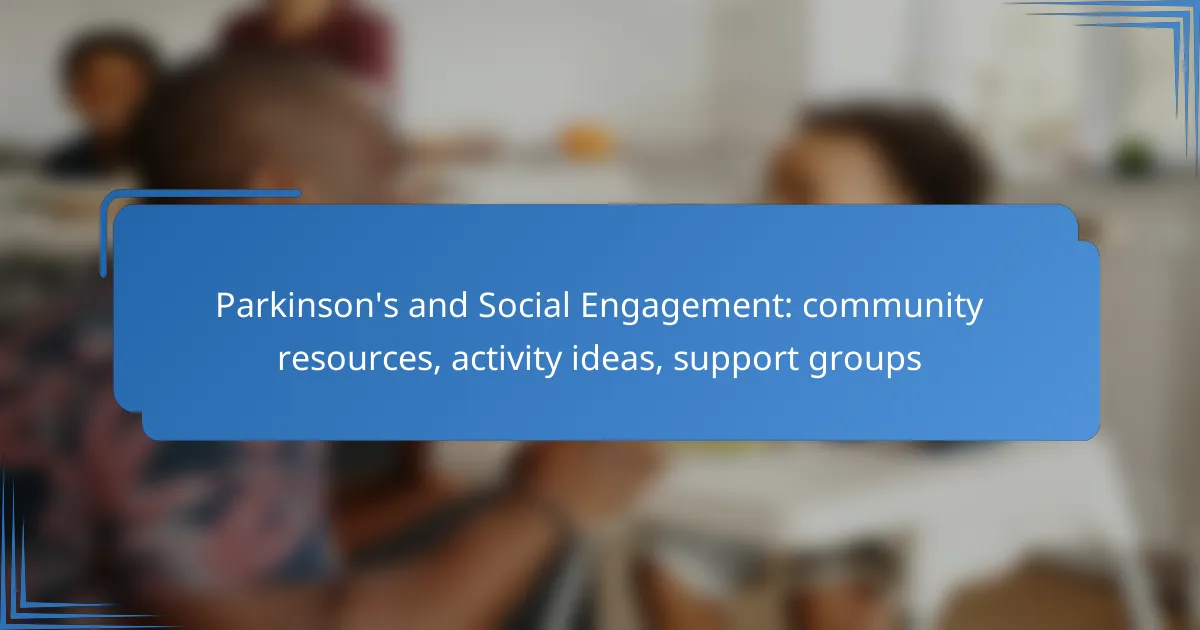In New Zealand, individuals with Parkinson’s disease can benefit from a variety of community resources designed to enhance their quality of life and promote social engagement. By participating in local activities and support groups, they can foster meaningful connections, reduce feelings of isolation, and improve their overall emotional well-being.
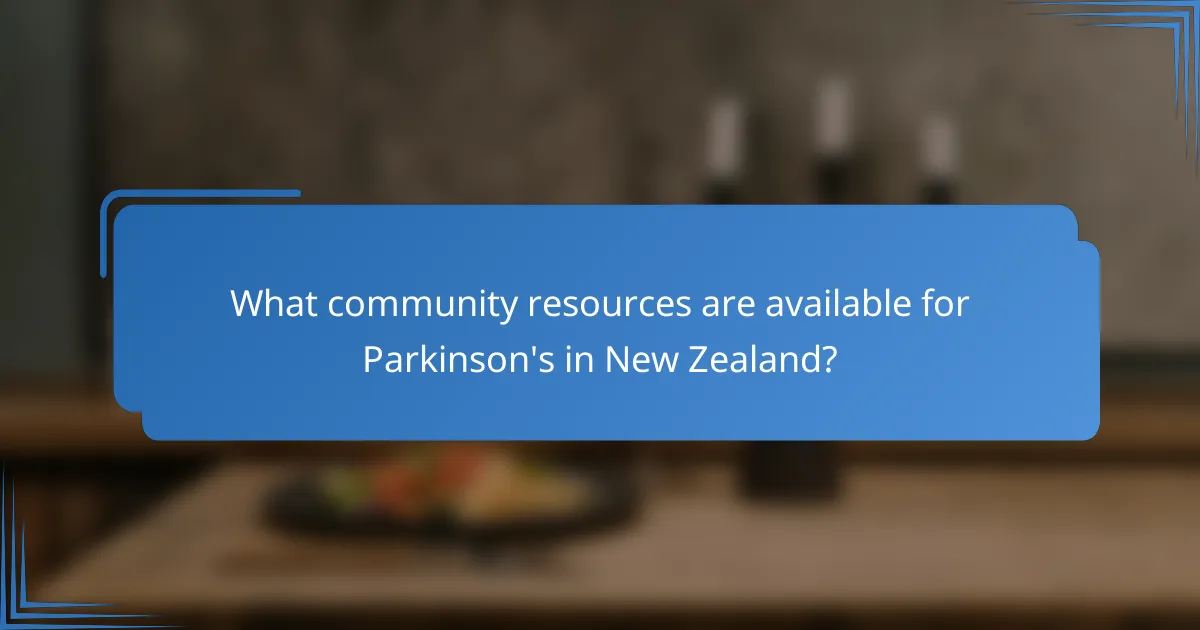
What community resources are available for Parkinson’s in New Zealand?
In New Zealand, various community resources support individuals with Parkinson’s disease, focusing on enhancing their quality of life and social engagement. These resources include dedicated support services, local health clinics, and online platforms that foster community connections and provide valuable information.
Parkinson’s New Zealand support services
Parkinson’s New Zealand offers a range of support services tailored to individuals living with Parkinson’s. These services include information and advice, advocacy, and access to local support groups that facilitate social interaction and emotional support.
Additionally, the organization provides educational resources and workshops that empower patients and caregivers with knowledge about managing the disease. Engaging in these services can significantly improve well-being and provide a sense of community.
Local health services and clinics
Local health services and clinics play a crucial role in managing Parkinson’s disease in New Zealand. Many hospitals and community health centers offer specialized clinics that focus on Parkinson’s care, providing access to neurologists, physiotherapists, and occupational therapists.
Patients are encouraged to participate in regular check-ups and therapy sessions to monitor their condition and adapt treatment plans as necessary. These clinics often collaborate with support groups, creating a holistic approach to care and community engagement.
Online resources and forums
Online resources and forums provide valuable platforms for individuals with Parkinson’s to connect and share experiences. Websites such as the Parkinson’s New Zealand site offer a wealth of information, including articles, videos, and links to webinars focused on living with the disease.
Forums and social media groups allow for real-time interaction, enabling users to seek advice, share coping strategies, and build friendships with others facing similar challenges. Engaging with these online communities can help reduce feelings of isolation and foster a sense of belonging.
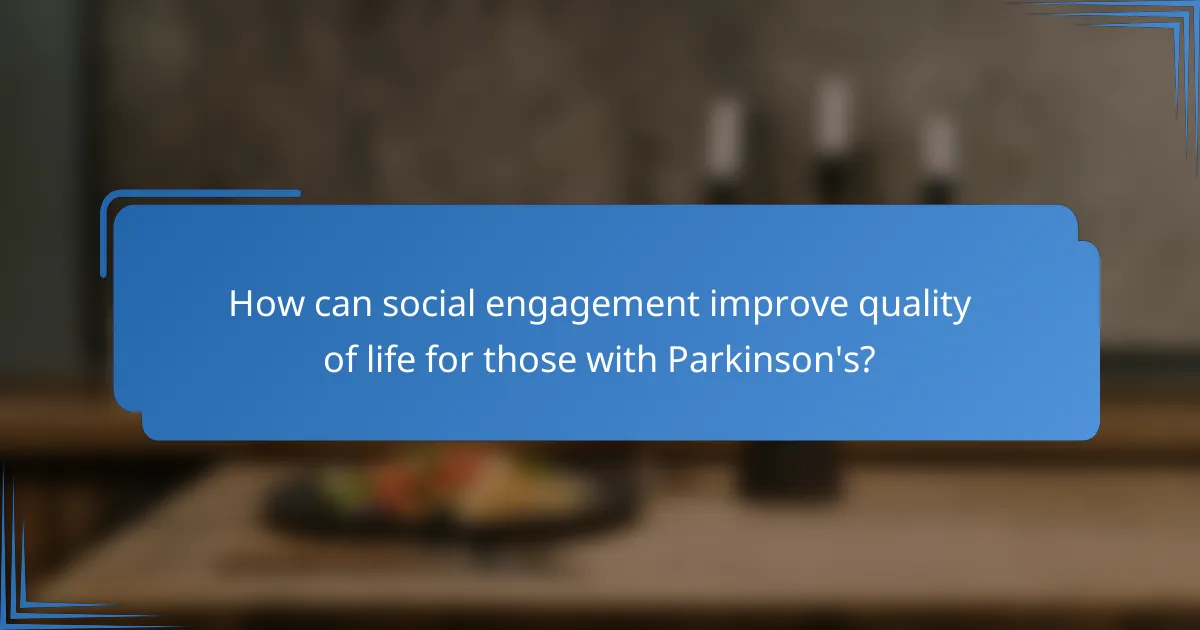
How can social engagement improve quality of life for those with Parkinson’s?
Social engagement can significantly enhance the quality of life for individuals with Parkinson’s by fostering connections and reducing feelings of isolation. Participating in community activities and support groups encourages interaction, which can lead to improved emotional well-being and a sense of belonging.
Benefits of social activities
Engaging in social activities provides numerous benefits for those with Parkinson’s, including increased motivation and a sense of purpose. Activities such as group exercises, art classes, or community events can stimulate both physical and cognitive functions, helping to maintain mobility and mental sharpness.
Additionally, social interactions can lead to the sharing of experiences and coping strategies, which can be invaluable for managing the disease. Regular participation in these activities can create a routine that promotes consistency and stability in daily life.
Impact on mental health
Social engagement plays a crucial role in supporting mental health for individuals with Parkinson’s. Regular interaction with peers can help alleviate feelings of depression and anxiety, which are common among those living with this condition. Building relationships within support groups can foster a sense of community and understanding.
Moreover, engaging in social activities can boost self-esteem and confidence. When individuals with Parkinson’s participate in group settings, they often find encouragement and validation, which can significantly enhance their overall outlook on life.

What activity ideas can enhance social engagement?
Engaging in social activities can significantly improve the quality of life for individuals with Parkinson’s disease. Activities that promote interaction, creativity, and physical movement are particularly beneficial in fostering connections and enhancing well-being.
Group exercise classes
Group exercise classes tailored for individuals with Parkinson’s can provide both physical benefits and social interaction. These classes often focus on improving strength, balance, and coordination, which are crucial for managing symptoms. Look for local community centers or gyms that offer specialized programs.
Consider classes such as tai chi, yoga, or dance, which not only promote physical activity but also create a supportive environment. Joining a group can help participants feel less isolated and more motivated to stay active.
Art and music therapy sessions
Art and music therapy sessions are excellent ways to enhance social engagement while allowing for self-expression. These therapies can help individuals with Parkinson’s connect with others through shared creative experiences, reducing feelings of loneliness.
Look for local organizations or therapists that offer group sessions in painting, pottery, or music-making. Participating in these activities can stimulate cognitive function and improve mood, making them valuable additions to a social engagement strategy.
Community gardening projects
Community gardening projects provide a hands-on way for individuals with Parkinson’s to engage socially while enjoying the outdoors. Working together in a garden fosters teamwork and can lead to lasting friendships among participants.
Check with local community centers or gardening clubs for opportunities to join a gardening group. These projects can be adapted to various physical abilities, ensuring that everyone can contribute and benefit from the experience.
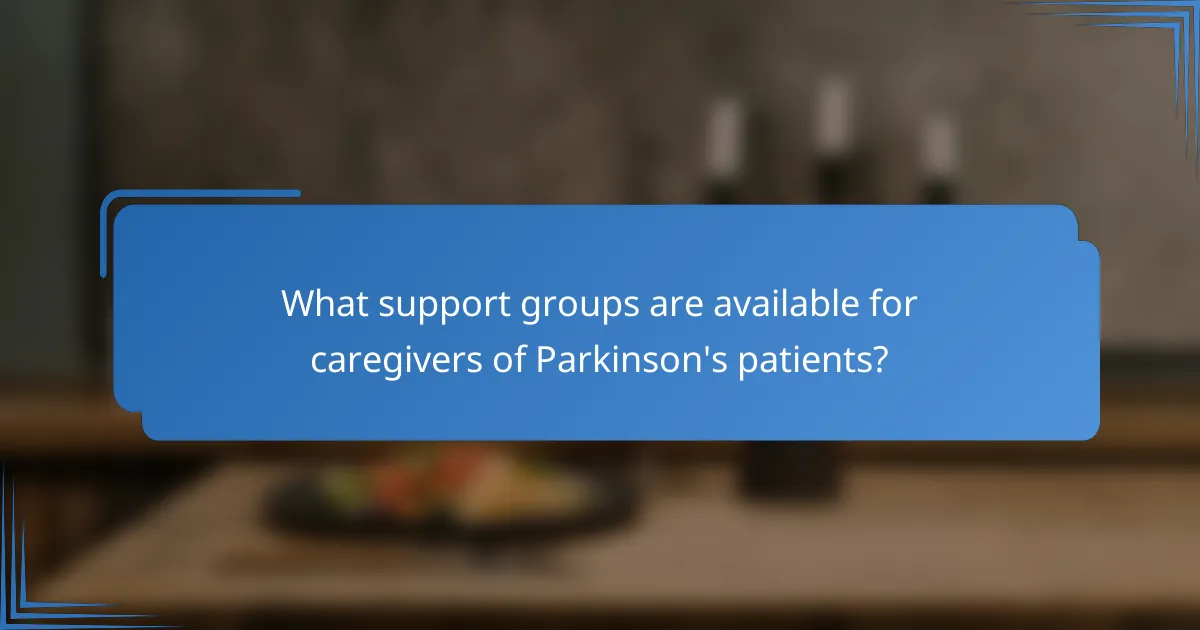
What support groups are available for caregivers of Parkinson’s patients?
Caregivers of Parkinson’s patients can access various support groups designed to provide emotional assistance, practical advice, and community connections. These groups can be local or online, catering to different needs and preferences.
Local caregiver support networks
Local caregiver support networks often include in-person meetings where caregivers can share experiences and strategies. These groups may be organized by hospitals, community centers, or nonprofit organizations focused on Parkinson’s disease. Participating in these networks can foster a sense of belonging and reduce feelings of isolation.
Examples of local resources include the Parkinson’s Foundation and the American Parkinson Disease Association, which often have chapters in various regions. Caregivers can benefit from workshops, educational sessions, and social events that enhance their caregiving skills and provide respite.
Online caregiver communities
Online caregiver communities offer a flexible option for support, allowing caregivers to connect from home. These platforms often include forums, social media groups, and dedicated websites where caregivers can ask questions, share tips, and find emotional support at any time.
Popular online resources include the Parkinson’s Disease Caregivers Facebook group and websites like Caregiver Action Network. These communities can be particularly helpful for those who may have mobility issues or live in remote areas, providing access to a broader range of experiences and advice.

How to choose the right support group for Parkinson’s?
Selecting the right support group for Parkinson’s involves considering your personal needs and preferences. Look for groups that offer a welcoming environment, relevant resources, and activities that resonate with you.
Criteria for selecting a support group
When choosing a support group, consider factors such as location, meeting frequency, and the group’s focus. Some groups may emphasize emotional support, while others might offer educational resources or social activities.
Accessibility is crucial; ensure the meeting space is convenient and accommodating for individuals with mobility challenges. Additionally, consider the group’s size, as smaller groups may foster more intimate discussions, while larger ones can provide a broader range of experiences.
Questions to ask potential groups
Before joining a support group, ask about the group’s structure and the qualifications of the facilitators. Inquire whether the group is led by a healthcare professional or someone with personal experience with Parkinson’s, as this can influence the quality of support provided.
Also, ask about the group’s activities and topics of discussion. Are they aligned with your interests? Understanding the group’s focus will help you determine if it’s a good fit for your needs. Finally, find out if there are any membership fees or requirements, as this can vary significantly between groups.

What are the benefits of joining a Parkinson’s support group?
Joining a Parkinson’s support group offers individuals a chance to connect with others facing similar challenges, providing both emotional and practical benefits. These groups foster a sense of community, enabling members to share experiences and resources that can enhance their quality of life.
Emotional support and understanding
Support groups create a safe space where individuals can express their feelings and concerns about living with Parkinson’s disease. Members often find comfort in knowing they are not alone, which can significantly reduce feelings of isolation and anxiety.
Sharing personal stories and coping strategies can lead to deeper connections and friendships. This emotional support can be vital for both patients and caregivers, helping them navigate the complexities of the disease together.
Access to resources and information
Support groups often provide valuable information about Parkinson’s disease, including treatment options, lifestyle changes, and local resources. Members can learn about new therapies, medications, and research developments that may benefit their condition.
Additionally, many groups organize workshops, guest speakers, and informational sessions that cover various aspects of living with Parkinson’s. This access to resources can empower individuals to make informed decisions about their health and well-being.
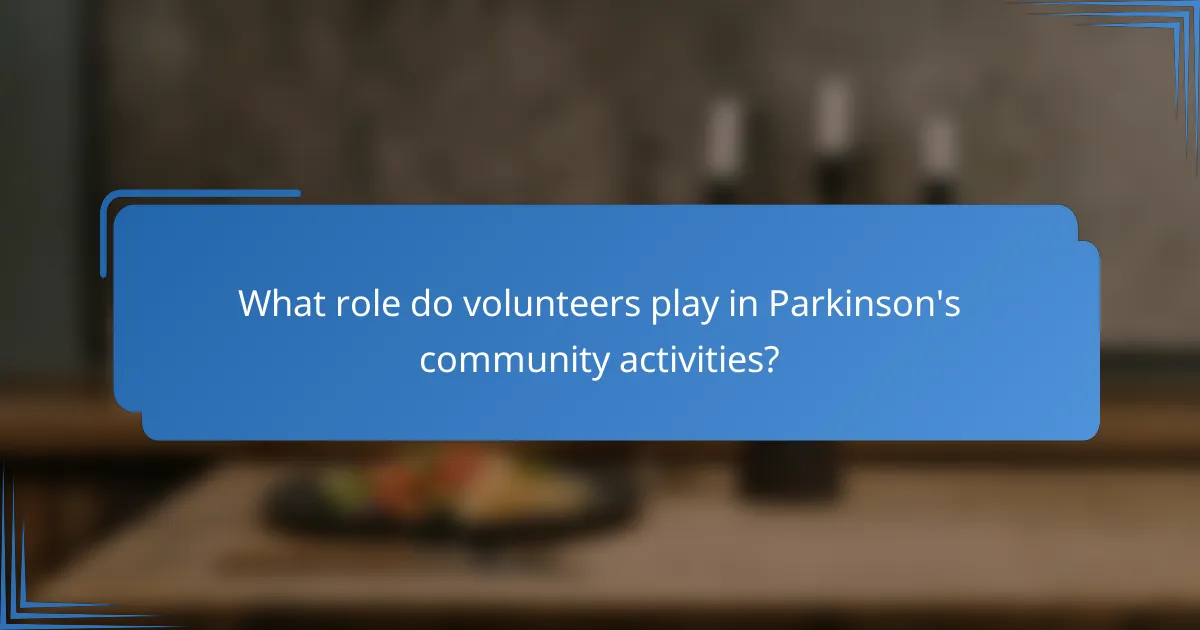
What role do volunteers play in Parkinson’s community activities?
Volunteers are essential in Parkinson’s community activities, providing support, companionship, and facilitating engagement for those affected by the condition. They help organize events, lead support groups, and create inclusive environments that enhance social interaction among individuals with Parkinson’s.
Volunteer opportunities in New Zealand
In New Zealand, various organizations offer volunteer opportunities specifically tailored for Parkinson’s support. These include roles such as event coordinators, support group facilitators, and activity leaders for exercise or arts programs. Interested individuals can connect with local Parkinson’s associations or community health services to find suitable roles.
Volunteers can also participate in fundraising events, helping to raise awareness and funds for research and resources. Engaging in these activities not only supports the community but also fosters personal connections and shared experiences among participants.
Impact of volunteering on community engagement
Volunteering significantly enhances community engagement by fostering a sense of belonging and support among individuals with Parkinson’s. Volunteers create opportunities for social interaction, which can alleviate feelings of isolation often experienced by those living with the condition.
Moreover, active volunteer involvement can lead to increased awareness about Parkinson’s disease within the broader community. This awareness can drive more resources and support for affected individuals, ultimately improving their quality of life. Engaging volunteers also cultivates a network of support that benefits everyone involved, reinforcing community ties.
